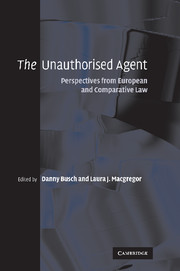Book contents
- Frontmatter
- Contents
- List of contributors
- Foreword
- Preface
- Abbreviations
- Table of cases
- 1 Introduction
- PART 1 The civilian legal systems
- PART 2 The common law
- 6 Unauthorised agency in English law
- 7 The Restatement (Third) of Agency and the unauthorised agent in US law
- 8 Unauthorised agency, the American Restatements and other common law countries
- PART 3 Mixed legal systems
- PART 4 International ‘codes’
- PART 5 Conclusions
- Bibliography
- Index
6 - Unauthorised agency in English law
Published online by Cambridge University Press: 07 September 2009
- Frontmatter
- Contents
- List of contributors
- Foreword
- Preface
- Abbreviations
- Table of cases
- 1 Introduction
- PART 1 The civilian legal systems
- PART 2 The common law
- 6 Unauthorised agency in English law
- 7 The Restatement (Third) of Agency and the unauthorised agent in US law
- 8 Unauthorised agency, the American Restatements and other common law countries
- PART 3 Mixed legal systems
- PART 4 International ‘codes’
- PART 5 Conclusions
- Bibliography
- Index
Summary
Introduction
Typically, an agency relationship arises when one party, known as the principal, authorises another, known as the agent, to act on the principal's behalf and the agent agrees to do so. The principal and agent relationship is therefore generally constituted by the mutual consent of the principal and the agent. They will be held to have consented if they have agreed to what amounts in law to such a relationship, even if they do not recognise it themselves and even if they have professed to disclaim it. The consent must, however, have been given by each of them, either expressly or by implication from their words and conduct.
Where the principal and agent have given their consent to the agency relationship arising between them, the agent will have actual authority, within the scope of what has been agreed, to affect the principal's legal relations, usually by entering into a contract with a third party that will be binding on the principal. By this, commerce is facilitated, for it will often be difficult or inconvenient for a person or other entity engaged in business always to transact directly with the counterparty, particularly where the business undertaking is a large and complex one. Much day-to-day transacting will be facilitated by officers and employees of the business undertaking acting within the scope of the authority that has been conferred on them, whether expressly or by implication.
- Type
- Chapter
- Information
- The Unauthorised AgentPerspectives from European and Comparative Law, pp. 185 - 218Publisher: Cambridge University PressPrint publication year: 2009
- 1
- Cited by

